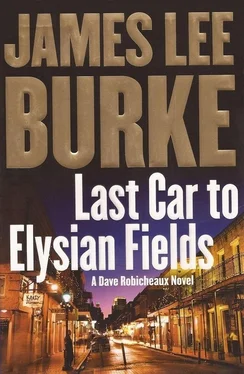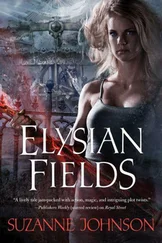Everything I did in the next few minutes would be based on my belief that Gretchen Peltier had truly been sickened by her experience with Will Guillot and had not gone back to him or confessed she had given him up.
He jerked open the door and stared into my face. He wore a burgundy corduroy shirt and gray slacks and loafers, and in the dim light the birthmark on his face looked like a scar from a hot iron. Behind him I saw a woman get up from the couch and go into the back of the house.
“Do I need to call the cops?” he said.
“I’m the least of your troubles, Mr. Guillot. I think your electrician wants to park one in your brainpan,” I said.
“ What ?” he said, his eyes shifting from me to Clete, who had just walked out of the yard, stepping up on the gallery with the twelve-gauge resting in the crook of his arm.
“It’s clear,” Clete said to me.
“What’s clear? Why are you walking around in my yard with that shotgun?” Guillot said.
“Your electrician, Herbert Vidrine, gave you up. But I guess that wasn’t enough for him. Evidently he hates your guts. What’d you do to the poor guy?” I said.
“I already found out about that letter you or somebody else sent him with my name on it. It didn’t work,” Guillot said, his eyes flicking from me to Clete and the shotgun again.
“Try this. You got Herbert Vidrine to help you break into Dr. Samuel Bernstine’s office the same weekend Bernstine took two .25 caliber rounds in the head. You set off the alarm, then found out you had the wrong code numbers for the keypad. But fortunately for you somebody had given you the password and you were able to give it to the alarm service when they called.”
Guillot tried to let my words slide off his face, biting down with his back molars so his jaw didn’t sag. “Then arrest me so I can sue you into the next dimension,” he said.
“You think this is about some pissant BE?” Clete said.
“Who is this guy?” Guillot said to me.
“There’s my buzzer,” Clete said, opening his PI. badge, then flipping it closed again before Guillot could look at it carefully. “The G doesn’t spend its time on nickel-and-dime farts who make dirty movies. But unlucky for you, a guy we do care about, a psychopath named Max Coll, is in the neighborhood, and it’s got something to do with you and the cocksucker you work for.”
Guillot looked behind him, as though he did not want our words heard by the woman who had gone into the back of the house. If he had closed the door in our faces and called his attorney, it would have been over.
But Clete had set the hook and Guillot couldn’t pull it out. He stepped out on the porch with us and pulled the door shut behind him, shivering slightly in the cold.
“What’s the deal on this guy you mentioned, what’s his name, this guy Coll?” he said.
“He blows heads for the IRA or the Mob or just because he can’t get it up in the morning,” Clete said.
“He’s here, in Franklin?” Guillot said to Clete.
“You tell us,” Clete said.
Guillot looked out into the darkness, as though trying to see beyond the Christmas lights that partly illuminated his yard. “None of this has anything to do with me,” he said.
“Let me ask you this question: When the warrants are cut, or if Max Coll is in town, looking for the people who put the whack on him, whose grits are going into the fire, yours or Castille LeJeune’s?” I said.
Clete pumped a shell out of the shotgun’s chamber and dropped it into Guillot’s shirt pocket. “Twelve-gauge double-ought bucks. Load up your bird buster and stick it under your bed. Better than a warm glass of milk. You’ll sleep like a baby. I guarantee it,” he said, and gave Guillot the thumbs-up sign.
Ten minutes later we turned into Fox Run and drove down the long, oak-lined driveway to Castille LeJeune’s front entrance. Almost the entire house was scrolled with white Christmas lights, so that the house glowed like a nineteenth-century paddle-wheeler inside a fog bank on the Mississippi. My guess was that Will Guillot had called LeJeune as soon as we had left his house, and I hoped, in an undeniably mean-spirited fashion, that for the first time in his life Castille LeJeune was genuinely afraid.
I parked at the end of the drive and cut the headlights on my truck. A solitary shadow moved across the windows in the living room. I started to get out, but Clete hadn’t moved, the shotgun propped at an angle between his legs, the chamber open.
“Dave, Guillot’s a sex freak and a lowlife and dirty up to his elbows. I’m not so sure about the guy in that house,” he said.
I looked at him.
“All this crap isn’t adding up for me,” he said. “The war hero didn’t pop the drive-by daiquiri guy and neither did Guillot, not if you buy his alibi. But for one reason or another we keep looking at the war hero. No matter what happens, it’s always the war hero. Meanwhile Merchie Flannigan’s old lady gets a free pass, the same broad who got you kidnapped.”
“Theodosha is south Louisiana’s answer to Bonnie Parker?” I said.
“Be a wise-ass if you want. You hate the guy in that house and the class of people he comes from.”
“ I do? You’ve been at war with these people all your life.”
He took off his utility cap, looked at it as though he had never seen it before, then refitted it on his head. “He really bagged Bed Check Charley?” he asked.
“That’s the story.”
“I’d like to get his autograph. Hey, I’m serious,” he said.
He got out of the truck, trying to suppress his grin, and followed me onto the porch. A white-jacketed black houseman answered door, a broom and dustpan in his hands.
“Is Mr. LeJeune home?” I said.
“Took his guests to the country club a half hour ago. I’m still cleaning up,” the houseman said.
I opened my badge. “Did you receive a phone call in the last ten minutes?” I said.
“Yes, suh, I sure did,” he answered.
“From whom?”
“My wife. She tole me to bring home a loaf of bread.”
On the way to the country club Clete was still grinning.
“Why is all this funny?” I said.
“I miss the Mob. Shaking up a bunch of Kiwanians just doesn’t cut it.”
“You’re too much, Cletus.”
In that mood we pulled into the tree-bowered entrance of a small tennis and golf club outside the city limits. It wasn’t hard to find Castille LeJeune. He and his friends were having drinks under a pavilion and driving golf balls on a lighted practice range dotted in the distance with moss-hung live oaks that smoked in the mist. The range looked hand clipped, immaculate, with neither a leaf nor windblown scrap of paper on it.
The pavilion seemed as isolated and disconnected from the outside world as the golf range was from the trash-strewn roads beyond the hedges that bordered the club. Deferential black waiters brought LeJeune and his friends their buttered rum drinks on silver trays; a Wurlitzer jukebox next to the bar played Glen Miller and Tommy Dorsey recordings; a rotund, cherry-cheeked man was speaking affectionately about “an old nigger” who had worked for his family, as though the waiters would take no offense at his language.
We locked the truck, with the twelve-gauge inside, and walked past the clay tennis courts, all of them deserted, the wind screens rattling in the breeze, just as Castille LeJeune whacked a ball off a tee and sent it downrange in a high, beautiful arc. The people at the tables or teeing up from wire buckets filled with golf balls showed no recognition of our presence. LeJeune positioned himself, swung his driver back, and once again lifted the ball surgically off the tee, high into the darkness, a testimony to his health, the power in his wrists and shoulders, and the maturity and skill he brought to his game.
Читать дальше












